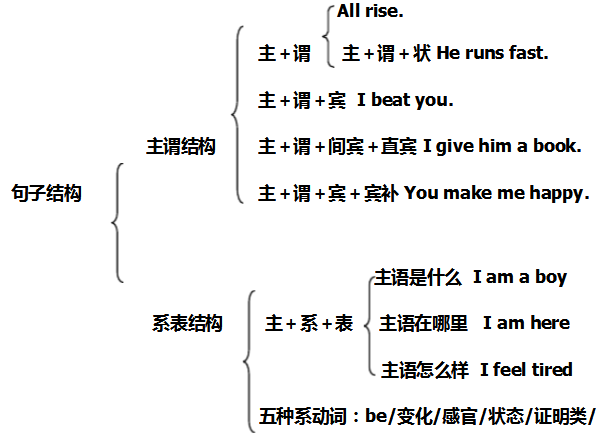英语基础(一)句子成分和结构
一、英语句子成分和英语句子结构讲解:

(一)句子成分
1.主语(subject): 句子说明的人或事物。
主语可以由名词、代词、数词、不定式、动名词、分词、主语从句和短语等来担任。
The sun rises in the east.(名词) He likes dancing. (代词) Twenty years is a short time in history. (数词) Seeing is believing. (动名词) To see is to believe. (不定式) What he needs is a book. (主语从句) It is very clear that the elephant is round and tall like a tree. (It形式主语,主语从句是真正主语)
不定式:
定式的全称是“动词不定式”,是一种非限定动词,由不定式符号to+动词原形构成。
不定式具有动词的特征,同时也有名词、形容词和副词的特征。
动词不定式是一种非限定性动词,由to+动词原形构成,
但它还是属于动词,所以它本身可以带宾语和状语。
动词不定式在句中可以作主语、宾语、表语、定语和状语,还可用在复合结构中,而且有完成式、进行式、完成进行式和否定形式。
动词不定式的被动形式除了一般形式外还有其完成式和进行式。
从句:
用代词、副词、连词把一个简单句作为另外一个简单句的从属成分的句子。
副词:
副词是一种用来修饰动词,形容词,全句的词,说明时间,地点,程度,方式等概念的词. 分为:地点副词.方式副词.程度副词.疑问副词.连接副词. 副词连用顺序:程度副词+方式副词+地点副词+时间副词.
副词在句中可作状语,表语,补语.
状语:
状语(adverbial)是句子的重要修饰成分,是谓语里的另一个附加成分,
它一般附加在谓语中心语前面,从情况、时间、处所、方式、条件、对象、肯定、否定、范围和程度等方面对谓语中心词进行修饰、限制。
英语状语修饰动词、形容词、副词或整个句子;
状语和副词代表不同的概念:
状语是句子成分。与之相对应的是定语、补语、表语等成分。
而副词是词性,与之相对应的是名词、动词、形容词等词性。副词可以作状语。
2.谓语(predicate): 说明主语的动作、状态和特征。
简单谓语:由动词或动词词组组成
I saw the flag on the top of the hill?
He looked after two orphans.
复合谓语:由情态动词或助动词+动词;
He can speak English well.
She doesn’t seem to like dancing.
找出下列句中的谓语(注:只有动词才可作谓语。):
1. We love China.
2. We have finished reading this book.
3. He can speak English.
4. She seems tired.
3.表语(predicative): 系动词之后的成分,表示主语的性质、状态和特征。
系动词的功能主要是把表语(名词、形容词、某些副词、非谓词、介词短语、从句)和它的主语联系在一起,说明主语的性质、特征、品性或状态。
它有自己的但不完全的词义,不能在句中独立作谓语,必须和后面的表语一起构成句子的谓语。
常见的系动词有: be, sound(听起来), look(看起来), feel(摸起来,smell(闻起来), taste(尝、吃起来), remain(保持,仍是), feel(感觉)
It sounds a good idea. The sound sounds strange.
Her voice sounds sweet. Tom looks thin.
The food smells delicious. The food tastes good.
The door remains open. Now I feel tired.
找出下列句中的表语。
1. I am a teacher.
2. They are on the playground.
3. My job is teaching English.
4. It gets cold.
5. It sounds interesting.
4.宾语:
1)动作的承受者-----及物动词或介词的宾语
I like China. (名词)
He hates you. (代词) How many do you need? We need two. (数词) We should help the old and the poor. I enjoy working with you. (动名词) I hope to see you again. (不定式)
Did you write down what he said? (宾语从句)
2) 介词后的名词、代词和动名词-----介宾
Are you afraid of the snake?
Under the snow, there are many rocks.
3) 双宾语-----间宾(指人)和直宾(指物)
宾语分为直接宾语和间接宾语.(直接宾语指物或事,间接宾语指人或动物)
He gave me a book yesterday.
Give the poor man some money.
指出下面句子的间接宾语和直接宾语:
please pass me the book.
He bought his girlfriend some flowers.
找出下列句子的宾语部分:
1. We often help him.
2. He likes to play basketball.
3. We enjoy listening to the music.
4. She said that he felt sick.
5. They are talking about the new student.
5.宾补:对宾语的补充,全称为宾语补足语。
有些及物动词除了有一个直接宾语以外,还要有一个宾语补足语,说明宾语的身份和状态以补充其意义不足,使句子的意义完整。
这类常用的及物动词有 :
We elected him monitor. (名词) We all think it a pity that she didn’t come here. (名) We will make them happy. (形容词) We found nobody in. ( 副词 ) Please make yourself at home. 介词短语) Don’t let him do that. (省to不定式) His father advised him to teach the lazy boy a lesson. (带to不定式) Don’t keep the lights burning. (现在分词) I’ll have my bike repaired. (过去分词)
6.主补:对主语的补充,全称为主语补足语。
He was elected monitor. She was found singing in the next room. He was advised to teach the lazy boy a lesson.
ps:主补是否都是被动句?
7.定语:修饰或限制名词或代词的词、词组或句子。
Ai Yanling is a chemistry teacher.(名词) He is our friend. (代词) We belong to the third world. (数词) He was advised to teach the lazy boy a lesson.(形容词) The man over there is my old friend.(副词) The woman with a baby in her arms is my sister. (介词) The boys playing football are in Class 2. (现在分词) The trees planted last year are growing well now. (过去分词) I have an idea to do it well. (不定式) You should do everything that I do. (定语从句)
ps:如果修饰这个词是宾语和主语是不是就是宾补和主补了?
定语后置:
如果定语是由一个单词表示时,通常要前置。而由一个词组或一个句子表示时,通常则后置
The girl in red is his sister.
We have a lot of work to do. The girl standing under the tree is his daughter. Do you know the man who spoke just now?
ps:主补/宾补和定语的区别是什么?
8.状语:用来修饰v., adj., adv., 或句子。表示时间、地点、原因、结果、程度、条件、方式和让步。
I will go there tomorrow. The meeting will be held in the meeting-room. The meat went bad because of the hot weather. He studies hard to learn English well. He didn’t study hard so that he failed in the exam.
I like some of you very much. If you study hard, you will pass the exam. He goes to school by bike. Though he is young, he can do it well.
ps:状语和定语只是根据修饰的词性判断?
(二) 句子结构
简单句的五个基本句型
1.主语 +不及物动词 She came./ My head aches. 2.主语 +及物动词+宾语 She likes English. 3.主语 + 系动词 +表语 She is happy. 4.主语 + 双宾动词+间接宾语 +直接宾语 She gave John a book. 5.主语 + 宾补动词 + 宾语 + 宾语补语 She makes her mother angry. The teacher asked me to read the passage.
https://wenku.baidu.com/view/a29a74f3650e52ea541898cd.html
1, 主谓结构 ( 主语 + 不及物动词 )
1、你应该努力学习 You should study hard. 2、他昨天晚上很晚回家 She went home very late yesterday evening.
练习: 1、This box weighs five kilos. 这个盒子重五公斤。 2、I lived in Beijing five years ago. 五年前我住在北京。
2,主谓宾结构 (主语 +及物动词 +宾语 )
1、我昨晚写了一封信 I wrote a letter last night. 2、我今天下午想和你谈谈 I want to talk with you this afternoon. 练习: 1、All of us believe that Jack is an honest boy. 我们大家都相信Jack 是一个诚实男孩。 2、He did not know what to say. 他不知道说什麽好。
3,主系表结构 (主语 +系动词+表语 )
1.我的弟弟都是大学生 My brothers are all college students. 2.在冬天,白天很短夜晚很长 In winter, the days are short and the nights are long.
3. 布朗女士看上去很健康 Mrs Brown looks very healthy. 4.在他15岁那年他成为了著名的画家 At the age of fifteen he became a famous pianist. 练习: 1、树叶已经变黄了。 The leaves have turned yellow. 2、这个报告听起来很有意思。The report sounds interesting.
ps:表语怎么感觉有点像主补?区别在哪?只是因为有系动词?
4,双宾语结构 (主语+双宾动词+间接宾语+直接宾语)
1.强森先生去年叫我们德语 Mr Johnson taught us German last year. 2.祖父昨晚给我讲了一个有趣的故事 Grandma told me an interesting story last night.
练习: 1、 请你给我弄一本新的,好吗? Will you please get me a new copy? 2、我替你叫辆出租汽车好吗? Shall I call you a taxi?
5,复合宾语结构 (主语 +动词 + 宾语 + 宾语补足语 )
1.我们叫她爱丽丝 We call her Alice. 2.他父母叫他约翰 His parents named him John. 练习: 1、学校定了一条规则,开始上课时学生要起立。 The school made it a rule that the students should stand up when class begins. 2、我认为与那个人谈话是无益的。 I thought it no use talking with that man
6,There be 句型
1.今晚不会开会 There isn’t going to be a meeting tonight. 2.这个村庄里只有一口井 There was only a well in the village. 练习: 1、铃响了。There goes the bell 2、一周有七天。There are seven days a week


